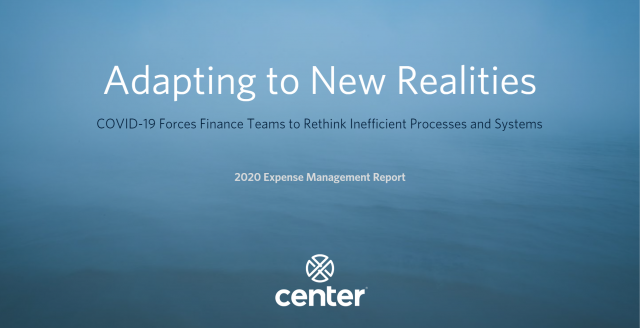2020 Expense Management Report: Adapting to New Realities

Learn what finance professionals had to say about adapting to the challenges of 2020, which tools they’re using, and more.
We recently surveyed 200+ finance professionals the current state of expense management within their organizations. Earlier on, we shared ways to combat the ambiguity of a pandemic to your organization through information and action. In this report, light is shed on how finance teams plan to approach expense management and drive key priorities forward over the next six months amid the ongoing implications and challenges of the COVID-19 pandemic. Notably, in this second-annual business spend study we found 91 percent of finance teams plan to prioritize technology initiatives to improve spend management processes in response to economic uncertainty.
Economic Downturn Highlights Need for Better Cost-Controls
While the shift to remote work and the dramatic decline in travel over the last six months has led to fewer expense reports to process, finance teams have come under more pressure to analyze spend, identify opportunities for cost savings, and understand where they stand on revenue and expenses as budgets are cut.
“Last year, we found that 87 percent of finance teams use some type of software to manage expenses. But the amount of effort they put into the overall expense management process rarely allows enough time to focus on important strategic work,” said Naveen Singh, CEO and cofounder, Center. “The unprecedented events of this year, however, have reinforced the enormous need for businesses across the country to finally invest in better visibility, better cost controls, and automation, as many cite their current processes as “chaotic.” From upgrading legacy software and investing in digitizing manual processes, to leveraging accurate, real-time financial data, business leaders need the resources, now more than ever, to make more informed business decisions.”
Finance Teams Still Spend Majority of Time on Manual Tasks
According to Center’s latest survey, finance teams still spend most of their time on routine, often manual and/or paper-based tasks. Mirroring the findings in last year’s report, finance teams in 2020 spend the most time on the following buckets: invoice processing (23 percent), expense processing and reconciliation (22 percent), and reporting (20 percent).
Within these buckets, the top five activities for finance teams in 2020 are analyzing spend, aggregating data for reporting, tracking down receipts and expense reports, auditing expense reports and working with lines of business to optimize spend. “Tracking down receipts and expense reports” was the top-ranked activity for 46 percent of respondents in 2019. This year, that number dropped by half to 23 percent, while analyzing spend moved to the top position, reflecting finance teams’ efforts to implement better processes that allow for real-time reporting, analyzing and decision-making.
The top two tasks finance professionals hope to dedicate more time to in the coming months include process improvements (26 percent) and strategy and planning (23 percent).
Spreadsheets Still Reign Supreme Among Current Expense Management Processes
This year, only 19 percent of finance professionals surveyed cited their current expense management processes as “smooth sailing,” down from 26 percent in 2019. This drop could be due to the fact that a shocking 40 percent of finance teams still use spreadsheets as their primary means of expense management. Prone to errors, spreadsheets and paper-based tools are significantly less efficient than automated expense management platforms and often cause a slower month-end close process.
The Future of Expense Management in a COVID-19 World
Most survey respondents indicated that many of the initial challenges they faced at the onset of the pandemic have subsided in recent months. Yet different roles within an organization have varying perceptions of the initial challenges versus those still felt today. For example, 87 percent of CFOs cited working remotely as a challenge at the onset, while only 20 percent still agree with that sentiment. Conversely, 53 percent of controllers thought remote work was a challenge in the early days of the pandemic, while that number has grown to 59 percent today.
Despite seemingly acclimating to many of the challenges presented by COVID-19, finance teams are focused on identifying more efficient ways to work. On this front, 84 percent have more than one initiative planned or underway. The most popular initiatives include:
- Digitizing paper or manual invoice and expense processes (68 percent)
- Improving data tracking, reporting, and dashboards to help decision-making (67 percent)
- Automating routine finance princesses through AI, ML, and robotic process automation (66 percent)
- Upgrading legacy software (62 percent)
- Shifting away from spreadsheet-based budgeting (61 percent)
Survey Methodology
In August, 2020, Center surveyed more than 200 finance professionals from U.S.-based companies of all sizes for this report. For the purpose of comparing based on company size, mid-size companies were defined as 100 to 500 employees.
About Center
Center offers a complete corporate card and real-time expense management solution that automates the entire spend cycle from planning through purchase, processing, and posting to the general ledger. Together, its Center® Corporate Credit Card powered by Mastercard® and Center Expense, its Real-Time Expensing, Audit and Insights software, help finance teams gain real-time visibility into expenses, reduce time to monthly close, and surface data-driven insights.
To learn more about how finance teams can implement better expense management processes in the current economic environment and beyond, download Center’s full 2020 Expense Management Report:Adapting to New Realities.
